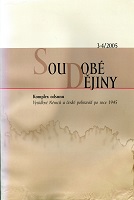Těžba uranu versus "očista" pohraničí. Německé pracovní síly v Jáchymovských dolech na přelomu čtyřicátých a padesátých let 20. století
Uranium Mining versus the “Purging” of the Borderlands: German Labour in the Jáchymov Mines in the Late 1940s and Early 1950s
Author(s): Tomáš DvořákSubject(s): History
Published by: AV ČR - Akademie věd České republiky - Ústav pro soudobé dějiny
Summary/Abstract: The article is concerned with a rarely researched topic in the history of migration after the Second World War – namely, the development of the uranium industry, the nationalities policy of the Czechoslovak state, and social (particularly ethnic) change in the Jáchymov region. First, the author points to the fact that the uranium deposits in Czechoslovakia after the Second World War became the basis for the rapid development of a whole new branch of industry. The strategic importance of this raw material for the Soviet Union, which was trying to build up its own nu¬clear arsenal, made uranium mining the priority at the start of the Cold War. Of key importance in this were the Jáchymov Mines, an enterprise established at the north-western frontier of Czechoslovakia in early 1946 on the basis of the Czechoslovak-Soviet Agreement of November 1945 and run by a mixed Czechoslovak-Soviet commission. The author argues that the Jáchymov Mines brought about a local revolution in the region in the course of the larger post-war ethnic-demographic revolution, which was determined by the mass expulsion of Germans and the centrally-controlled colonization of the regions using ‘ethnically reliable’ settlers. In this context he discusses the second German settlement of some villages, in which the German in¬habitants again came to constitute a large part or even the majority. A consequence of this process was the emergence of a unique community in this small region, comprising various groups of original inhabitants and new arrivals. The article also considers local relations between ethnic Czechs and ethnic Germans, which were sometimes marked by Czech hostility, and points out the contradiction between most Germans’ desire to move to Germany and the declared attempt by the State, beginning in 1949, to force them to assimilate by taking Czechoslovak citizenship. In conclusion, he states that when uranium ceased to be mined in the 1960s most of the remaining Germans left the region, and this contributed to further depopulation and decline
Journal: Soudobé Dějiny
- Issue Year: XII/2005
- Issue No: 03-04
- Page Range: 626-671
- Page Count: 46
- Language: Czech

